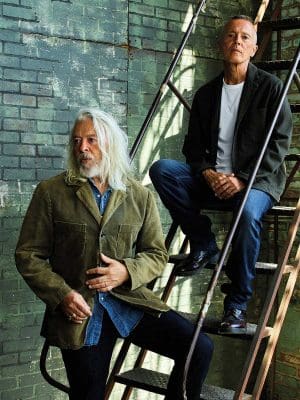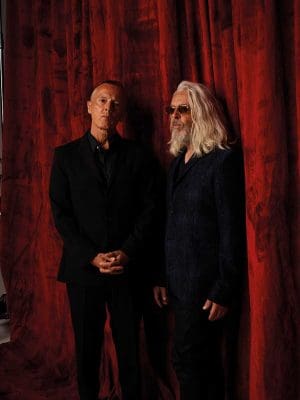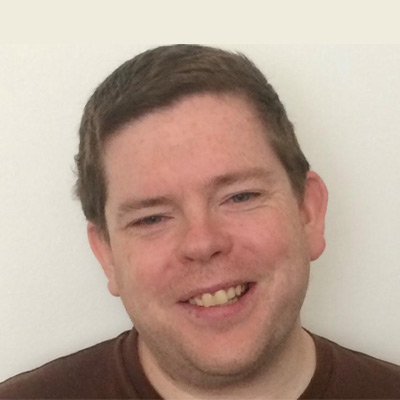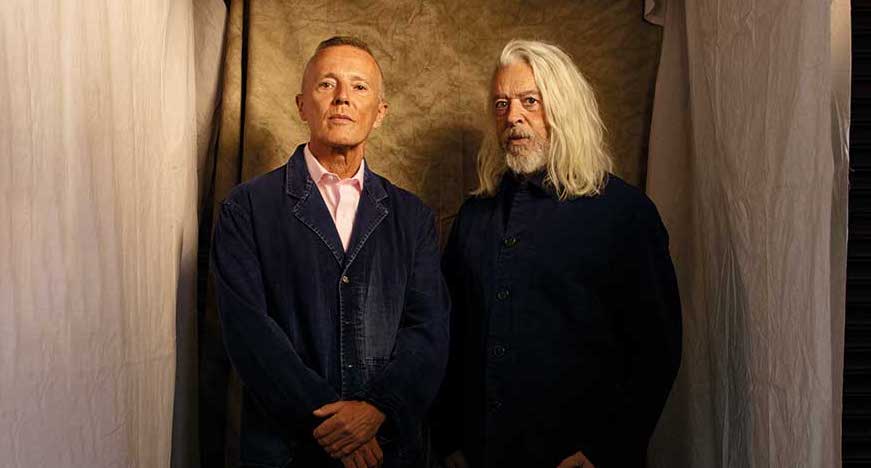 Tears For Fears’ long-awaited comeback, The Tipping Point, is “our most ‘us’ album”, according to Curt Smith. He’s not wrong. Curt and Roland Orzabal have finally regained their friendship, as well as their professional relationship. The path to that renewal is a compelling story of grief, prescription drug problems, threats to quit and, ultimately, trust…
Tears For Fears’ long-awaited comeback, The Tipping Point, is “our most ‘us’ album”, according to Curt Smith. He’s not wrong. Curt and Roland Orzabal have finally regained their friendship, as well as their professional relationship. The path to that renewal is a compelling story of grief, prescription drug problems, threats to quit and, ultimately, trust…
The seeds of the renewal of Tears For Fears’ friendship, instead of maintaining a cordial business relationship, have been hiding in plain sight to fans for five years. Stay, one of two new songs on 2017’s singles compilation Rule The World, is a thoughtful and mostly acoustic ballad driven by an especially plaintive Curt Smith vocal.
It reappears as the final song on The Tipping Point, the duo’s first all-new album since 2005’s Everybody Loves A Happy Ending. Quietly concealed at the time, it transpires Stay describes how Smith was thinking about leaving Tears For Fears for the second time.
“We’d finished a new album and I didn’t like it,” Curt reveals now. “Roland and I had dinner in Bath, and I told him, ‘If this is going to be the new record, I don’t want to be a part of it.’”
Roland has told Classic Pop before of the aborted album the duo had recorded in a series of what they dub “speed dating” sessions with new songwriters – Bastille singer Dan Smith co-wrote Rule The World’s other new track, I Love You But I’m Lost. In Smith’s view, if Orzabal was happy with the results, good luck, no hard feelings.
“I went back home to LA and started to write Stay,” Curt continues. “I realised it would be painful to leave the band, because it’s such a big part of my life. It’s cavalier to throw around the idea of ‘I’m off’ every now and again. But the reality of that is it’s not easy. I want to stay, because it’s such an integral part of my life, but is it good for me?
“Is it good for my health? Writing the song helped me want to stay and try to work it out, to think, ‘Let’s not make a hasty decision.’ I have to look after my mental and physical health, but Tears For Fears is an important part of my life. So is Roland.”
Orzabal, silent until now about his friend’s turmoil, chips in: “Yeah, sorry about that.” And Tears For Fears both laugh, an idea which would have been unusual a few years ago, especially in an interview. Having carried out interviews separately for years since their reunion, for The Tipping Point the pair are relaxed and jokey with each other.
Matching their musical roles in an interview suite at old-school posh London hotel The Landmark, Roland is given to enjoyable flights of fancy, his conversation going down fascinating, unexpected byways, with Curt reigning him back in via some well-timed one-liners.
For all their jokiness, the reasons for their emotional distance during that period are bound up in the grief from the death of Roland’s wife Caroline in 2017. The couple were childhood sweethearts, and Curt was also good friends with Caroline since they were part of a group of mates aged 13 in the band’s hometown of Bath.
Roland has spoken movingly before about Caroline’s struggles with alcohol, which eventually contributed to her death. Roland’s loss is described poignantly in the stunning new ballad Please Be Happy and The Tipping Point’s magical, dreamlike title track.
“For the last few years of Caroline’s life, I was bringing a lot of that anger into my situation with Curt,” states Roland. “I’m not very proud of that, but that’s the way it is.”
He believes writing about his grief was inevitable, explaining: “Those songs weren’t hard to write at all. As a songwriter, you take all the bad things and make them harmonious. You take what’s going on inside you – which is 99% the same as what’s going on with other people – and make it a beautiful way of communicating. I had serious subject matter, and I had no choice but to write those songs.”
Early in our interview, Orzabal casually mentions “I was on my second rehab” when writing sessions began in earnest on The Tipping Point. Asked what happened, there’s a wary look. “How long have you got?” he smiles. The year after Caroline’s death “was a write-off.”
A small intake of breath and then Roland explains just how brutal life became in 2018. “Christmas 2017 was the first at the family home with the boys without Caroline,” he starts. “I was chugging down the wine and, on December 28th, I had an attack of something – panic, grief – that I thought was a heart attack.”
Rather than ring for an ambulance, Orzabal tried to combat the attack with “every pill I had”: Nurofen, paracetamol, blood pressure pills and sleeping pill Ambien. The attacks kept coming over subsequent weeks, and were only stopped by the Ambien.
A medical check-up revealed nothing but, in March 2018, Roland had “a chronic, big-time” seizure. He was admitted to London’s Royal Free Hospital. Further seizures were treated with benzodiazepines, because “you go into a psychotic state with a seizure.” Orzabal tried discharging himself, saying, “I didn’t know what the hell was going on. I had long black hair, a skull T-shirt and big rock and roll boots.
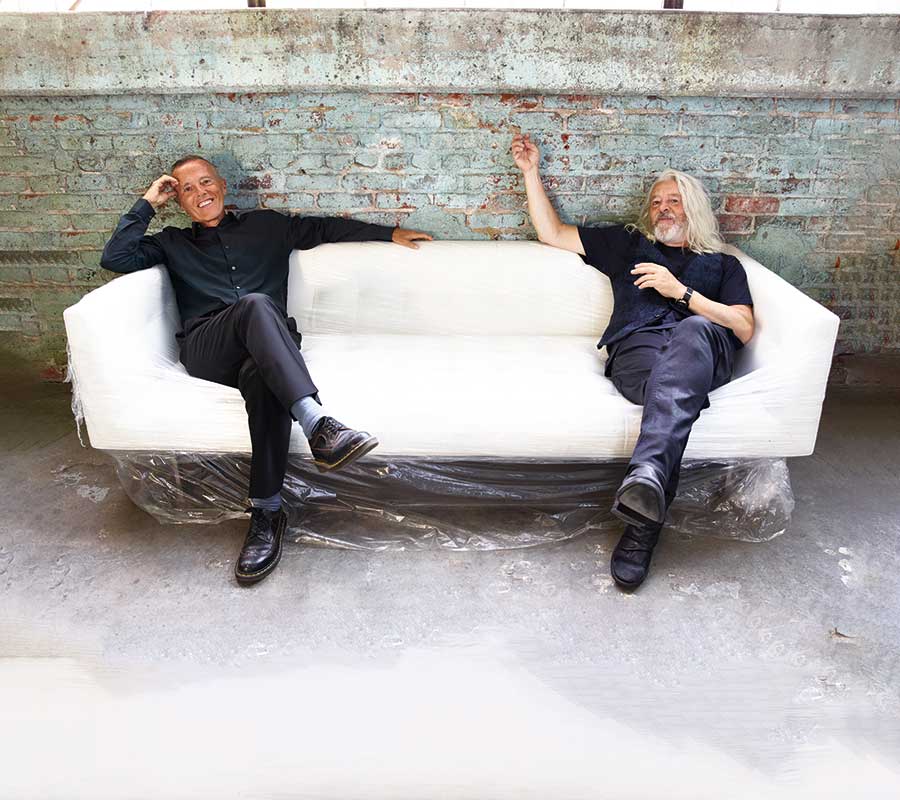
After blacking out, Roland woke up in a different ward and a guard on the door to prevent further escape attempts. “They were playing our 80s hits to remind me who I was,” he says with a wry smile. A bad reaction to one of his injections meant “I lost the ability to see in three dimensions. I tell you, that was fucking weird.”
That impaired vision led Orzabal to believe he was living in a reality TV show based in the hospital. “I was walking round the ward looking at everyone, thinking, ‘How am I here?’” he recalls. Roland also believed he was now living two years in the future. When his sons Pascal and Raoul visited, he asked them: “Why are you wearing the same clothes you wore two years ago?”
A month after he was discharged, Orzabal developed a convulsive disorder which meant he couldn’t control the movement of his head, or his abdominal and pectoral muscles. The spasms lasted six weeks. Another smile: “I looked ripped, which was the only good thing about it.”
Again, the only control for these attacks was Ambien. Roland realised the medication was taking control. “Ambien was the real killer,” he states. “Using Ambien like I was is fucking dangerous.”
Orzabal voluntarily entered rehab, where he had PTSD exercises to help stop the shakes. A fortnight later, he was initially fine. But Roland needed more treatment, visits to cardiologists, neurologists and ultimately a second rehab stint before he truly became well again.
“What happens with grief is that you go into denial,” he reflects. “I’m very good at denial, and unfortunately my body doesn’t like it. It took me out. It wrecks your confidence, because you know there’s this thing inside you that can take you out at any point. It took a good long time, but I’m there now.”
Asked if Orzabal’s confidence is back, Smith gently interjects: “It’s back too much. You can’t keep Roland down.” Orzabal joins in: “You can’t keep a good man down, can you?” More relaxed laughter, to punctuate a story Roland naturally reveals “is very, very hard to talk about.”
Orzabal contacted Smith as soon as he had his first attacks, saying: “I really did think, ‘This is it.’ My mind went to: ‘I’ve got to call Curt, because this is fucking serious.’ Caroline was already gone and I knew Curt was important in my life.”
Read more: Roland Orzabal on Songs From The Big Chair
Read more: Making Tears For Fears’ The Hurting
Roland also credits the “love and support” of his new wife, photographer Emily Rath, for helping him through his dark year. Emily has also helped cement her husband and Curt’s friendship.
“Once I got all the crap out of the way with the personal stuff is when I suddenly understood Curt,” smiles Roland. “Emily is American, and she’s got a totally different approach to relationships than me, who grew up battling with my brothers on a working class council estate. Emily will say to me, ‘No, don’t say that.’
“She’s really mellowed me, and calls me out when I’m rude. I can be, ‘What the FUCK?’ and Emily will patiently say, ‘Excuse me?’” Smith smiles in recognition, adding, “Roland went through a few difficult years, understandably so. But Emily has helped bring out a side of Roland that we used to have, and now it’s back.”
While his bandmate was enduring his crisis, Curt was caught up in the global concerns of Donald Trump’s presidency. Smith has lived in the US for over 30 years, since meeting his American wife Frances Pennington, the marketing and branding head of fashion firm Tory Burch.
The couple were so concerned about the impact of Trump that they considered moving back to England. It’s a fear made explicit in the pulsating Break The Man. “The song came easily,” notes Curt. “It says, ‘Wouldn’t it be better if we had female leadership?’
“With two daughters, I have a family of very strong women. On the surface, Break The Man is about a strong woman. Really, the song is about trying to destroy the patriarchy, especially what we were going through at the time with Trump, who’s an alpha male arsehole.”
The day after Trump’s election win in 2016, Smith was driving his daughter Wilder, then aged 15, to school. Curt asked how she felt, worried how to placate her, and was surprised when Wilder said she was fine. Smith explains: “Wilder said, ‘We’re the next generation. That’s not us.’ That attitude gave me hope. It was the driver of Break The Man, hoping we have more of that view.
“My daughters gave me the confidence it was worth staying in the States, but it crossed my mind during the 2020 election that, if Trump won again, it would have been dangerous. I’d have thought seriously about leaving the US if Trump got back in. During his presidency, I didn’t feel that danger. I just felt annoyed for four years, waking up and thinking, ‘What the fuck has he done now?’ I don’t really look at CNN anymore, as Joe Biden isn’t going to do that much, thankfully.”
Spiritually, Break The Man and the powerful Rivers Of Mercy are similar to Woman In Chains, a reminder that Tears For Fears were writing songs about female empowerment long before most male artists. “I don’t think of us as leading the way for that,” Smith insists. “But we’re at our best when we’re honest.” Orzabal’s attitude is a little different. “One tries not to gloat,” he grins.
On its release in January, Break The Man became the first Tears For Fears single not to have Roland’s name in the writing credits. Curt co-wrote it with Charlton Pettus, Tears For Fears’ long-time live guitarist. The pair have known each other since playing in Curt’s late 90s band Mayfield (Curt is Mayfield, geddit?) Mayfield also featured Tears For Fears keyboardist Doug Petty, who co-wrote the haunting backing for Rivers Of Mercy with Charlton.
After the aborted writing sessions with the music industry’s hottest talents, it seems a little obvious that Tears For Fears’ most suitable co-writers were in their own backing band all along. Orzabal blushes prettily when this is put to him.
“That’s what my wife said,” he laughs. “When we were writing with this person and that person, Emily suggested, ‘Why not try writing with the band? You’ve got a great band.’ I had to admit, ‘I’ve never really thought of that.’ I’m so stupid, very slow to catch on. And it’s worked really well.”
Read more: Making Songs From The Big Chair
Read more: Top 40 80s debut albums
In hindsight, the duo aren’t surprised that Doug and Charlton have stepped up. “Our songwriting has become more inclusive,” Roland reasons. “They’ve played our old stuff for years and have absorbed it.” Curt adds: “The people we speed dated with tried to put their own stamp on what we’ve already done. That just doesn’t work.
“It needs someone who gets the dynamic, who knows the band’s history. The speed dating sessions were ‘I have something that sounds like Head Over Heels’, and that just didn’t seem like us.”
Initially, Orzabal actually enjoyed the poppier album resulting from those speed dating sessions. But it wasn’t just Smith who had doubts. Another dissenting voice was Tears For Fears’ then manager, Gary Gersh.
“There was a disconnect there,” notes Roland. “I had lunch with him while I was desperately trying to put together the album in my head. I was asking, ‘What do you think about this song? How about that one?’ Gary’s view was, ‘Oh, I don’t know. Fuck it.’ I thought, ‘Wow, OK. So, where does that leave us?’”
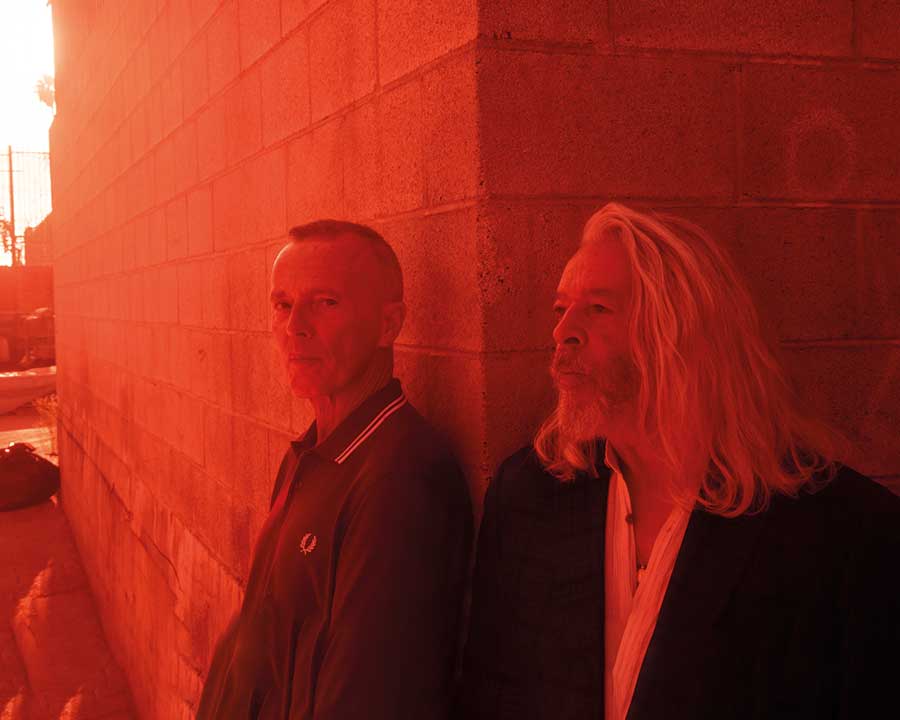
Universal Records were no keener on the initial version of the LP. “The album had been taken apart,” Orzabal explains. “Universal pulled out of it all quite cleverly. Well, I say ‘cleverly’, but I hope they live to regret it.”
It was around this period that Caroline died.
“I didn’t listen to those songs for a long, long time,” says Roland. “When I wasn’t very well, I remember one brief moment when I listened to it, thinking, ‘Hang on, why isn’t Curt singing more on these songs? What the hell is going on here?’”
Once Orzabal’s health improved, they returned to playing live, delighted at the response to their 2019 world tour. “And then, as we usually do after a long tour, we stopped talking to each other,” smiles Roland. “We both knew we had to stop playing live – we’re very good at it, but we’d done that. It was important to do something new.
“That meant going back to that album, big discussions about what we liked and didn’t like about it.” The short answer, they agreed, was, in Curt’s words, “It had too many Mothers Talks and not enough The Working Hours.”
Read more: Johnny Marr interview
Read more: Popscene – C86
Some of its pop songs remain on The Tipping Point, notably the dark electro pulse of My Demons. “That was a search for the hit single,” admits Orzabal. “It’s synth-punk – a nod and a wink to Depeche Mode. I can hear Dave singing My Demons. We’d write for Depeche and, if Martin Gore doesn’t want that, he should at least ask our co-writer Flo Reutter, who came up with its heavy riff.”
Once they worked out which songs could be rescued, Curt and Roland realised they still needed half an LP. Considering it had been 15 years since a new studio album, this sounds daunting. In reality, it was startlingly easy. “We had lunch in LA,” recalls Roland.
“We talked to each other and just relaxed. We realised we are who we are as people – and that we’re still OK, we’re still friends.” Immediately after lunch, they went back to Curt’s house to jam, something they hadn’t done in years.
“We sat there playing away and came up with this riff,” smiles Orzabal. That riff was the key to No Small Thing, the opening song and second single from The Tipping Point. It’s a hypnotic ride which, like Tears For Fears’ finest work, is impossible to predict.
“We were in sync,” enthuses Smith. “Straight away, that song sounded peculiar, which made me think ‘Yes!’, because it was going in a new direction for us. It led the way to realising how we could finish those other songs we already had, and how to be modern in an ‘us’ way.”
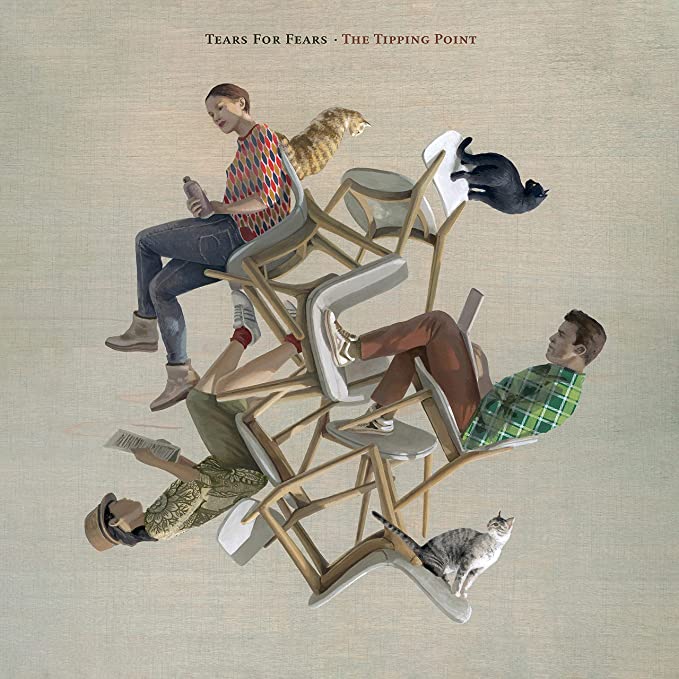
Tears For Fears – The Tipping Point cover
The fact No Small Thing twists in so many directions made it ideal to open the album. Curt considers: “It’s important that people think, ‘Oh, that’s not what I expected,’ and No Small Thing sets that tone.
“The album goes on to be a Tears For Fears record, but it makes people think, ‘They’re still doing stuff that’s interesting.’ When No Small Thing starts, I want people to think, ‘Oh my God, Tears For Fears have made a Johnny Cash record.’” Orzabal adds: “And then, before the end of the song, they’ll think, ‘Oh, and they’ve made a Led Zeppelin record, too.’ Starting with No Small Thing is because we want to fuck with people.”
The song Smith had the biggest reservations over, End Of Night, was initially viewed sceptically precisely because it’s such a pop banger.
Read more: Top 40 Kate Bush songs
“End Of Night doesn’t have the depth of the rest of the album,” he frets. “But there’s something about having it as the penultimate song that just works. There’s all the heavier music that comes before it so, when End Of Night arrives, you think, ‘Ah, a nice breezy pop song!’ It’s nice not to think for a few minutes by putting it there. It’s a good example of why it’s important to get sequencing right on an album.”
Curt famously didn’t feature much on The Seeds Of Love, and only co-wrote Head Over Heels on Songs From The Big Chair. Yet Smith co-writes half of The Tipping Point. “In a weird way, this is the most ‘us’ album we’ve done,” smiles Curt. “It’s another first album, and I love that,” continues Roland. “When I see the album cover, I get a vibe of The Hurting.”
They were fairly certain as soon as the title track was written that the album should be called The Tipping Point, though Orzabal laughs: “I threw alternatives at Curt, but none stuck. I was worried about naming an album after one of its songs. My argument was, we’d had an album out before that wasn’t a song title, and it had gone pretty well for us. The only alternative title I can remember is Save Me The Last Word, a line from Long, Long, Long Time which felt apt for us.”
They’re proper friends again, but do they still bicker? “Oh, we’ll always do that,” shrugs Curt. Roland agrees, reasoning: “Touring makes it worse. You have to deal with stress on tour. To some degree, we both deal with stress by isolating. I’m bad for that, as I think, ‘I’ve got to look after my voice, I’ve got to warm up for the stage, leave me alone!’ We can interact on stage, then not talk for the rest of the day. That’s the harmful bit.”
They haven’t written any new songs since completing The Tipping Point – “We haven’t been in the same room together enough,” reasons Roland – but that’s for the future. The new album makes it clear Tears For Fears are as close as they’ve been since their teenage Bath years. Why try to predict the future anyway.
“Plans?” laughs Curt, looking at his new-found best mate. “We never plan any of this.”
Read about how Tears For Fears came up with their name here
Classic Pop may earn commission from the links on this page, but we only feature products we think you will enjoy.

